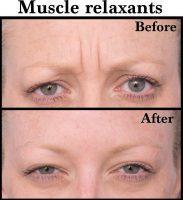How To Get Rid Of Deep Frown Lines On Forehead?
Getting rid of the glabellar “eleven” lines
The glabellar lines are sometimes referred to as the “11” lines, angry lines, etc. The most common treatment for this is Botulinum toxin (Botox, Dysport, Xeomin are most common) into the Procerus and Corrugator muscles that are causing these vertical lines.
If the vertical lines remain after complete paralysis of these muscles you may need injection of a filler into these lines, such as Hyaluronic acid.
Usually, the toxin is all that is needed. See your local plastic surgeon for a full consultation to review all of the options when it comes to facial rejuvenation. (Chet Mays, MD, Louisville Physician)
Botox will help soften the muscular action causing this lines so it doesn’t get worse over time, but it won’t do that much for the indentation which years of muscular action over time has caused.

BOTOX Can Be Re-injected Once The Effects Begin To Fade
Based on this, you should understand the risks and benefits and if you do opt for a filler, only go with a very experienced cosmetic physician who only uses microcannulae and is prepared for any possible complication.
Even though it won’t give as dramatic of a change in a single session, I recommend to my patients starting with PDO threads which do not have the same risks. (Rebecca Gelber, MD, Incline Village Physician)
Botox and filler combination.
A combination treatment would be best for crease. First, Botox can be used to relax the muscles that are causing the frown. Secondly, a filler such as Restylane can be used off-label to gradually fill in the crease.
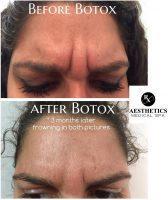
BOTOX Cosmetic Will Relax The Muscular Contractions Causing The Groove In Your Skin
Vertical crease in forehead removal. What is the best procedure?
I would start by performing Botox in the area. This will prevent the muscle from creating the crease. The crease appears to be deep in the skin is thin where the crease is located. Filler can help decrease the appearance of the crease. (Austin Hayes, MD, Portland Plastic Surgeon)
Botox and filler for deep vertical crease
A combination of botox and filler would help soften and over time erase the line. Even after the first treatment you should see a dramatic improvement, but a couple of treatments will continue to improve it. (Myriam Loyo, MD, Portland Facial Plastic Surgeon)
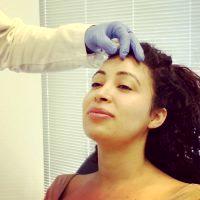
BOTOX For Vertical Creases In The Forehead
Definitely start with cosmetic botulinum toxin.
This is what these products were approved for by the FDA.
There are three approved cosmetic botulinum toxin products: BOTOX, Xeomin, and Dysport.
See a physician from one of the four core aesthetic specialties: Plastic Surgery, Facial Plastic Surgery, Ocuofacial/Ophthalmic Surgery, and Dermatology. (Kenneth D. Steinsapir, MD, Beverly Hills Oculoplastic Surgeon)
Vertical crease in forehead.
In order to address vertical wrinkle I would advise starting with Botox to help relax the underlying muscle and then injecting a hyaluronic acid based dermal filler to help fill in any residual crease. (Nelson Castillo, MD, Atlanta Plastic Surgeon)
Perfect Candidate for Botox + Filler Combo
These creases are called “static lines.” They form following years of using your forehead and glabella muscles in dynamic facial expression. Botox will help eliminate “dynamic lines” and may soften static lines somewhat.
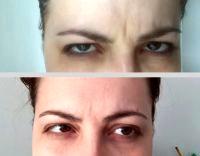
Botox Will Usually Significantly Improve The Appearance Of These Vertical Lines
I would recommend a “thinner” filler like the new volbella (currrently approced for perioral injection but used off-label throughout the face). In this area, I would recommend a filler with a low G prime. Lower G prime fillers will “spread” more and be less dense.
Volbella is also less hydrophilic (water-attracting) than some of the other fillers. (Ivan Vrcek, MD, Dallas Oculoplastic Surgeon)
Combination Of Botox & Filler Work Great For Vertical Glabella Lines Between The Eyes
This problem is relatively easy to treat and yields highly gratifying results when a combination of Botox and filler are injected. Botox (or Dysport or Xeomin) is used to relax the muscles responsible for the formation of the deep line in the first place (i.e. the dynamic component) and filler is injected to elevate the etched-in depression that has resulted from years of “folding” the skin in that region with each movement of the muscles–a thousand times plus a day every day for years.
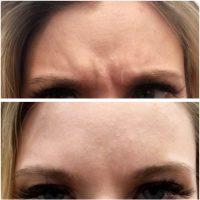
Frown Lines Can Be Improved With Botox In Combination With Fillers And Microneedling
Although Botox effects generally last between three and seven months and fillers about six to eight months, the combination approach often lasts about a year. Both treatments may be performed either during the same session or at separate treatment sessions.
This is a great area for a combination of Botox and Restylane
The form of crease that you have will respond beautifully to a combination of botox or dysport along with Restylane filler. Both work hand in hand to make it respond and change the indentation. The botox/dysport relax the area while the restylane plumps it up. (Joel Schlessinger, MD, Omaha Dermatologic Surgeon)
I would start with Botox (or similar Xeomin or Dysport) to weaken the muscles which cause the line. This is a quick and easy treatment. The results last about 3-4 months in most people. You might also consider filler injection into the line.
This is considered a higher risk area for filler so it is important to see an experienced injector. (Richard Ort, MD, Lone Tree Dermatologic Surgeon)
Vertical crease in forehead
This is treated with Botox or Dysport. This is the most common area treated and is caused by increase muscle activity in this area. The muscles treated are the corrugators and procerus muscles. It takes about 25-30 units of Botox for your treatment and it will last about 3 months.
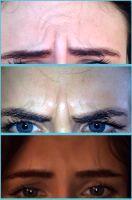
Starting With Regular Botox Treatments
I prefer to treat the underlying problem, the muscles, rather than use fillers. (Steven F. Weiner, MD, Panama City Facial Plastic Surgeon)
Botox and a filler helps soften frown lines.
A filler such as restylane or juvederm and botox, dysport or xeomin should really make those frown lines improved so much and is easy to undergo. (David Hansen, MD, Beverly Hills Dermatologic Surgeon)
The line between your eyebrows looks deep. A combination approach of Botox and filler would give the best results. See a specialist in this area. (James R. Gordon, MD, FACS, FAAO, New York Oculoplastic Surgeon)
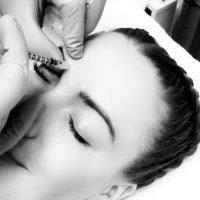
Treating With Botox Or Xeomin
Botox or Dysport would be a good option for you. It will relax the muscle in that area so that you cant make that line anymore. Being that you said the line has been there for several years, it may take several treatments to see the line relax fully.
In some cases, depending on how deep it is, you may need to put a small amount of filler in the area to help smooth it out. You should consult with a local cosmetic dermatologist for a full evaluation. (Janet Allenby, DO, Delray Beach Dermatologic Surgeon)
Vertical Crease
The vertical crease that you refer to in your picture is commonly called a frown line, “elevens” or glabellar lines. These lines result from repeated movements and contractions of the muscles between the eyebrows. Over time, these lines can deepen.
Neuromodulators, like Botox & Dysport, can be injected into these muscles to temporarily improve the moderate to severe frown lines. The neuromodulator prevents the muscle contractions that cause frown lines. It usually takes 4-7 days for the neuromodulator to begin working, with a maximum effect by 2 weeks.
If needed, you can also inject a dermal filler like Juvederm or Restylane to fill in any “valley” that is still visible after evaluating neuromodulator injection. (Aldo Guerra, MD, Scottsdale Plastic Surgeon)
Combination treatment with Botox and fillers
You have a relatively deep frown line caused by activity of the glabellar muscles. I start with Botox injection which will soften although probably not completely eliminate the line given its severity. If you require further correction, then I would add a filler such as Juvederm or Restylane.
The combination treatment will provide a nice result. (Shaun Patel, MD, Miami Physician)
Several options
Vertical wrinkles here result from activation of frowning muscles called the corrugator supercilii, and can present as the so-called “11 lines,” or as 1-3+ lines.
While Botox may soften these lines, it does not erase static lines, or lines present at rest. To fill in a static depression, you may benefit from an injectable dermal filler (such as Juvederm or Restylane), fat grafting, or a SMAS graft (collagen tissue enveloping the muscles of the face).
Please consult with a Dermatologist, Plastic Surgeon, Oculoplastic Surgeon, or Facial Plastic Surgeon for an in-person exam and a thorough discussion of your treatment options. (Inessa Fishman, MD, Atlanta Facial Plastic Surgeon)
